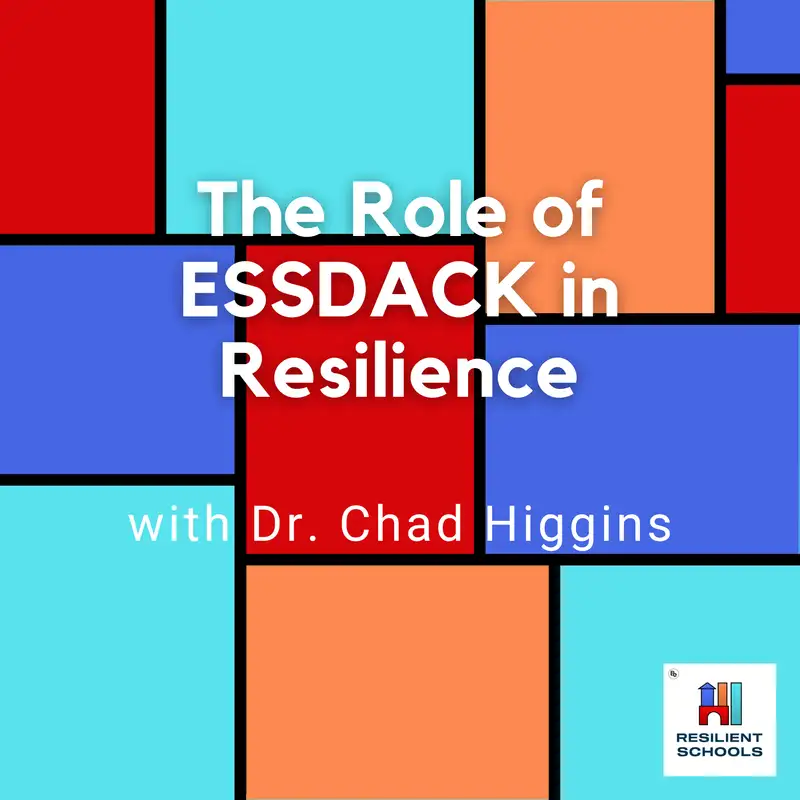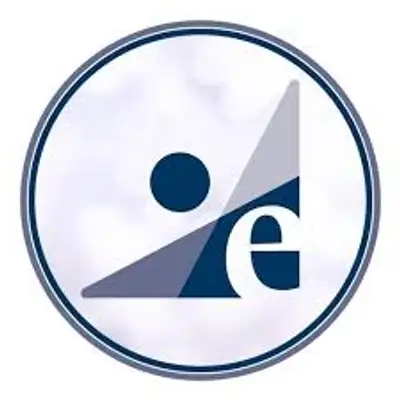 Episode 58
Episode 58
· 09:47
. Welcome to the Resilient Schools Podcast.
We're here at the Bridging to
Resilience Conference that's
put on by SDAC and we have Dr.
Chad Higgins, who's the
Executive Director of SDAC here.
Chad, thanks so much for joining us.
Tell us a little bit about
SDAC and what you guys do.
and what you guys do.
Our Educational Service
Center is 105 in Kansas.
We are celebrating 40 years.
This year from origination and this is
just my second year, but as a former
school superintendent, not my last
job, but the one before that I had we
were members of SDAC and participated
in several different things we used.
The resources we provide are pretty broad.
We run a health insurance
consortium for member districts.
I didn't know that either.
We run
a 403B, a TSA consortium.
We partner with a
financial planning company.
And we do title fund consortium work.
We have a inspired leadership team
that does coaching and culture audits
And then we have a
professional learning team.
So we have instructional coaches
and curriculum alignment specialists
and assessment and data and
all of those kinds of things.
And then of course, specific
to this conference is the
resilience team that we have.
And they do brain science and trauma
informed work all over the country.
. So this is really just one part
of all that you guys provide.
Yes.
But it's a pretty significant part.
Three days for a conference.
That's a lot of time.
Why is this such important work?
I think there's probably no
other more important work.
I think we have got to, we've
gotta get to the root of the
challenges, the crisis going on in
schools and communities and homes.
And we've gotta start impacting change
at all of those levels, helping people
understand, sources long term effects on
individuals and on communities, schools
and it doesn't have to be this way.
That's the, I think the part that
we pull our hair out about is we,
it's not that we're trying to, this
business in resilience and trauma
informed is not a, no money in it.
We're not trying to generate business
and we're not the only ones doing it,
obviously, but we just have tremendously
committed, passionate people that
just trying to get the snowball
rolling down the hill and then really
picking up speed and momentum and...
So,
what do you see as the potential
growth areas for you here?
What do you feel like you need to do
better or next in regards to resilience
and trauma informed practices?
We added another team member this
last year, somebody I had worked
with before who we had built
in that district.
This person was the resident expert
on trauma and resilience and care and
strategies and he worked with teachers
and counselors and administrators and he
could bounce around and he'd work with
kids and he would model and we're growing
that and you know using while we have him
his expertise and train some continue to
expand the training of our current staff
and hopefully potentially add some more
but what Eric has been able to do Without
experiences that get out into districts,
our member districts have a lot of smaller
schools that can't have, full time, folks.
And so
we're working
specifically with that team, but then
other teams as well to get more ingrained
in those schools where they need the
help the most and, student behavior
and crisis and attendance and is at
the top of the list for most schools.
And we can get in and spend some
time and train those teachers
and then again, that's the same.
The analogy with the snowball is they get
used to that and they get, they recognize
how a small investment of time and
resources can make such a huge difference.
They'll continue to do that work and
then they can, put all of their other
energy and resources into the things
that will just continue to help them
support students in their communities.
Yeah.
Yeah, I think that's well said.
When you think about the efforts that
go into doing this kind of training, and
really this kind of work, if key people
leave, Eric left his district and now
works for you, how do you make sure that
the vacuum is filled when pe when key
people leave in districts or in SDAC?
Yeah, that's well said.
I think you continue to, you make that
assumption, first of all that it's,
nothing's permanent that's the model
is we can't be everywhere either those
schools can't hire full time people to
do the work, so if we can help train,
help transfer that knowledge and that
experience and that understanding
of the science and the responsivity.
Then, I hate to keep using the same
analogy, but that's the snowball.
And as far as, whenever, and again,
Eric's not, with Rebecca and Carmen
and Katie and so forth, it's such
a strong team and Ginger that
Ideally, we just keep growing, and,
Eric's experience is different than
the others experience, but they're
also very used to being in schools and
working with kids and teachers he just
has, again, I think this diversity of
experience and styles and strategies, and
we just keep growing on that until you
have a complete team, and then you just
recognize when there's some turnover,
you figure out how to fill it out.
Yeah, so what's good about a conference
like this is that you have an opportunity
to see people coming up through the
system and their experiences, what they're
learning, what they take away, how they
implement it, all that kind of stuff.
In fact, one of the people that I
interviewed a few minutes ago is named
Sarah Reed, and she's only in her
second year teaching, but was home
with her own kids for a long time and
then came into teaching a little bit
later in life, and you could see that
this is impacting her in a way that's
This is going to be with her for a long
time, like sometimes you learn things.
You're like, Oh, that was good.
All right, I'll go back to
what I was doing for her.
This is going to make some changes.
And so this gives you an opportunity to
see who's out there and what they're doing
and to see how they grow and develop.
Yeah.
I'll switch analogies and talk
about the, a spark and a grass fire.
I think that's what we hope happens
from these kinds of experiences.
After I spoke earlier this morning,
I had a couple of young teachers
come and visit with me and.
They're passionate about this work and
trying to figure out how to create this
change and there's either resistance
in some cases or just a yeah we agree
with you and we support this but then
there's not a whole lot of movement and
so I think it's empowering folks and
they recognize that it might be more
comfortable for them to find a place
that's more in line with their beliefs
but
they can't do that They want to be
where they're at and they want to
create the change there and so that's
what gets exciting is when you can
generate some initiative for change
and build a little courage with some
knowledge and with a community like
this that there's a lot of hope I think.
yeah, for sure.
It's definitely something that
I'm seeing a lot of, from a lot of
different people, that there's hope.
And that's one of the questions that
I've been asking in what's your hope
for the future in these interviews.
So what's your hope for the future, Chad?
I'm very optimistic.
I think there's a message this morning.
This our young people are amazing.
I think they're so much more
global than we were and recognize
that their thoughts, opinions,
experiences aren't everybody else's.
Like I grew up that way.
Didn't understand why.
Not everybody agreed with me,
Yeah.
and so they're going to figure it out
sooner than we did, sooner than I did,
if they haven't already figured it out.
And I think they care for each other more.
I know we talk a lot, or we hear
a lot about bullying, and I would
contend that it's not nearly as
significant as it used to be.
Now, social media is creates a
challenge, but I think you also see,
I'm excited to see kids come out to
support each other and encourage each
other and it creates community as well.
I'm not anti social media or, globalism,
but but try to harness that energy.
So I'm incredibly excited that,
we just have to keep fighting.
And fighting's not the right word.
We, just keep grinding away
and changing hearts and minds.
I shared this morning that
I'm a perfect example of that.
I've come a long ways from where I
used to be to, to where I want to go.
Yeah, absolutely.
I certainly have too.
And that's something that being able
to do these kind of interviews and
talk to people and hear their stories
up close makes it really powerful
for me to be able to see the changes,
see changes in myself and how I'm
growing and developing as well.
Chad, any final words before we wrap up?
Anything you feel needs to be said?
I don't think so.
I, this is only my second year
and to be a part of it a little
more actively was very rewarding.
I think it's going to help me grow into
a different community than I've been, I'm
in school leadership for so long and a
little reluctant, honestly, to jump into
this stuff just because it's so out of my,
Skill set and knowledge set.
And there it's Such a cool crowd.
They are just the salt of the earth.
Incredible human beings who are
selfless and service oriented.
So I'm already looking forward to next
Yeah, me too.
This has been awesome.
This is my first time coming here.
I've known Ginger for at least
a decade at this point and and
been connected in different ways.
So this is really awesome.
And I'm grateful for the opportunity
to be able to interview people here.
And this has been really cool.
So thank you for that.
And thanks for coming on the show.
Appreciate it.
thank you.
This episode was edited by Max Cooper
as part of the Davis Catalyst Center.

Listen to Resilient Schools using one of many popular podcasting apps or directories.